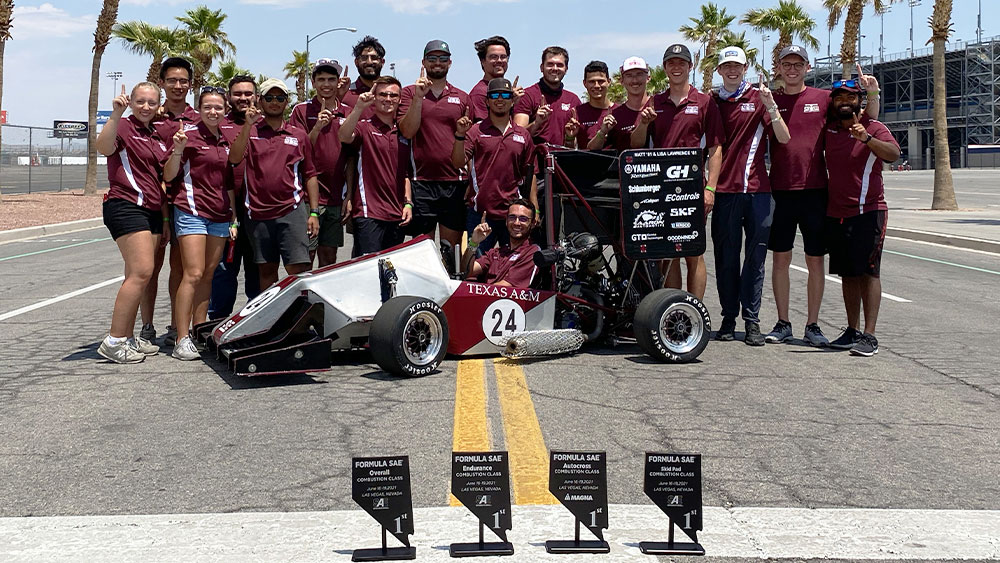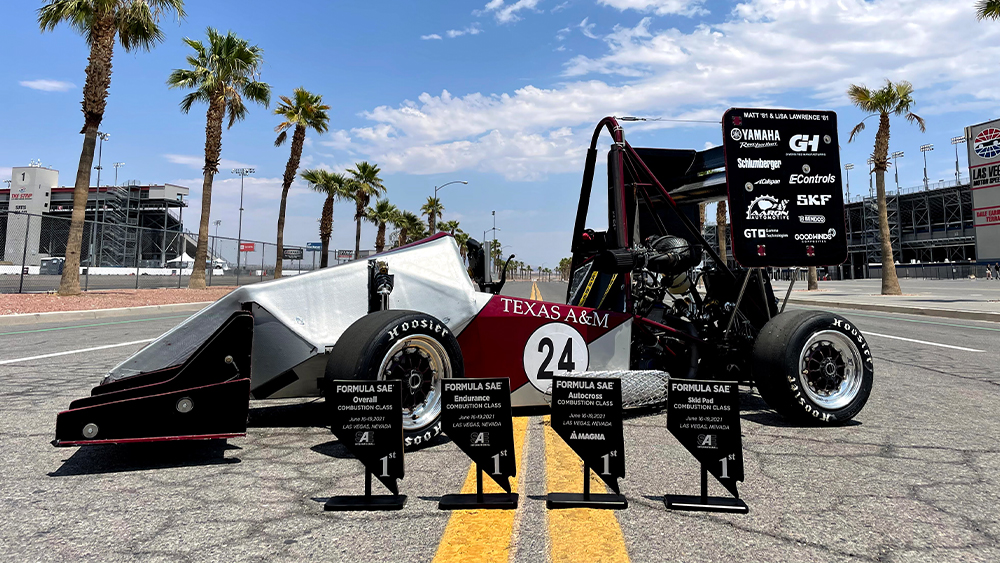On June 19, Texas A&M University students rushed down from the stands and onto the Las Vegas Motor Speedway track. Texas A&M's Formula Society of Automotive Engineers (FSAE) team took first place overall at FSAE Nevada, breaking the national record for the most points accrued by an internal combustion car during an FSAE competition and it was time to celebrate.
“When the official of the race said, 'Go see your team,' everyone sprinted onto the track,” said Carson Wilke, a student in the J. Mike Walker ‘66 Department of Mechanical Engineering. “I don't think we could have asked for a better week."
FSAE is an automotive collegiate design competition where student teams worldwide design, build and race a formula-style (single-person and open-wheeled) racecar. The teams compete in various events including static events, which involve specific design aspects of the car, and dynamic events that measure how the car performs on the track.

The team consists of 22 students from the mechanical engineering department, and four student drivers and one student business representative from the Department of Engineering Technology and Industrial Distribution. They were selected prior to the fall semester and have worked tirelessly on the project for nearly 10 months. At Texas A&M, the students’ experience is unique due to how the FSAE program is operated.
"The FSAE team starts from scratch on the car every single year, unlike most teams in this competition, which makes this victory even better," said Samantha Mersman, the team's project manager and a mechanical engineering student. "This unique opportunity allows senior mechanical engineering students to see a project from conceptualization to completion, helping us become technically competent and capable of forming and sharing our own engineering opinions. This has been the best experience in our entire college career. "
Each event has a winner, and how well you perform determines the number of points awarded. The static event is a detailed report documenting the cost of design, and the four dynamic events test different capabilities of the car, including acceleration, skid pad, autocross and endurance. They are also awarded points for the fuel efficiency of the vehicle, which is calculated after completing the endurance portion.
"Endurance is the most important event and what we modeled our design to handle," said Mersman. "The car must last through 22 kilometers, so a little bit over 13 miles. You're trying to finish before everybody else, but really, you're just trying to make sure that this car that college students created doesn't break."
The team took first in skid pad, first in autocross, first in endurance, sixth in acceleration and third in efficiency, leading the team to be the overall point winners and crowned sole champions. The team scored 927.7 out of 1,000 points, setting a new national record for an FSAE internal combustion car competition.

The team experienced a special moment when their car overtook another close competitor during the endurance competition, meaning the other vehicle was forced to enter the slow lane while Texas A&M was able to safely pass and pull ahead.
"We not only wanted to not break down, but we wanted to finish the race first," said Wilke. "We watched our car creep up on our competitor's car. Finally, the volunteer waved the slower car into the right lane so that ours could pass. It was one of the best moments and highlights of the race."
Along the way, faculty members from across the College of Engineering provided support to the team. Their advisor, Dr. Srikanth Saripalli, a professor in the mechanical engineering department, played a quintessential role in the team’s success.
"I think there are two qualities this team has; the first being that they are very disciplined," said Saripalli. "I think they were also resilient. They had many setbacks like COVID-19 and labs being closed, but they continued to do what they could. I knew they would do really well, but seeing the team take first place overall was even more impressive."
Texas A&M has now taken home this win eight times, including previous victories in 2000, 2006, 2007, 2009, 2011, 2017 and 2018.
The mechanical engineering department and the team would like to thank the numerous donors who helped make this possible, including General Motors, Matt '81 and Lisa Lawrence '81, and many local businesses in the Bryan-College Station area. They are also thankful for the RELLIS Campus, where they were allowed to conduct rigorous testing.
For more information regarding FSAE, please contact Stephanie Lampe.